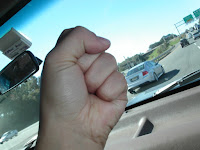or why what we think has
no bearing on how children understand
 “She hates breastfeeding.”
“She hates breastfeeding.”
“He is fighting sleep.”
“They are testing me
today.”
“Kids have to test the
limits.”
“Teens have to rebel.”
Nope, nope, nope, nope. No
to all.
A form of childism that
pervades our culture is seen in the way adults talk about children's
perceptions of the world –their aims, their understanding and their
experiences.
Kids don't 'test
boundaries' they struggle mightily to make any kind of sense out of
the world, from gravity to unspoken social rules (like why we
compliment people on weight loss but never mention gain, which is
kind of related to gravity) and part of that is pure science
experiment: what happens when I ...?
What happens when I pour
the water on the floor?
What happens when I pour it on the couch?
The
cat? When the sun is up?
When the lights are on?
When it's from a
sippy cup?
When it's from a bottle?
When it's from a bowl?
Adults, looking at this
typical exploration of the world will often say 'she's testing the
boundaries' or 'she's testing her parents.'
She isn't.
She's trying
to figure out why this cup-shaped stuff changes shape as it moves,
why it makes some things lighter and some things darker and why it
has not so far ever gone up the other way. If sometimes there is a
lot of clapping and cheering and sometimes there is anger and
shouting or punishment, she'll have to spend a lot of time
experimenting to figure out how to fit that into her understanding of
the world, too.
Years ago, John Bradshaw
(Family Systems theory) told a story of how little Farquar would be
happily jumping into a pile of cushions mum made for him in the
living room, to cheering and laughter, who later spots a pile of
cushions in the furniture store and can't for the life of him work
out why he's being shouted at and dragged by the arm from the
store... 'it looked like a pile of cushions to me...???'
We tend to personify our
worlds, generally: people cut us
off in traffic, they aren't distracted and hurried; the weather is
for or against our plans, depending on if it rains on our parade; if
we were to say that to someone only in anger, that can be the only
possible reason anyone else said it to us, ever... et cetera.

A brief
aside: the Fundamental Attribution Error is a common thought mistake
whereby we excuse our own errors (we didn't 'cut off that driver'
because they were going faster than we thought or we're just in a
hurry which makes it fine or understandable or otherwise completely
excusable) yet we attribute character flaws and/or malice to others
who do exactly the same things (they are Bad Drivers, they are
Selfish, Thoughtless, Idiots, Worthless, Reprobates.)
Becoming aware
of this common thought error can help us enormously in life, not the
least in preventing our own stress-caused heart attacks. Anyhow...
back to the point...
When we
are looking at our children's behaviour and attitudes, expressions
and postures, it's important to remember a number of vital things
before we react in anger or frustration:
Is
this a Fundamental Attribution Error?
Is
it possible to explain this behaviour in a neutral or positive
way?
Am
I attributing adult brain capacities to a child's brain?
Am
I taking personally something which genuinely has nothing at all
to do with me?
A
friend's son once rollerbladed up the aisle at church. In his
defense, he was a young teen and incapable of complex thought
processes like abstractions (How will this reflect on my mother's
parenting? What kinds of unspoken rules might this violate? How will
the parish see this? What deeper meaning might there be to aisles in
churches vis a vis casual sporting equipment?) and it was choir
practice, not sermon. In her defense, she'd not encountered a lot of
information about brain development and the differences between
adults' and children's brains at that point. To this day, she tells
the story wishing that she was anyone but his mother, so she could
have laughed because it was hilarious. Instead, she felt constrained
by her role as Mother to perform 'stern' and 'censorious' as she
believed she was expected (peer pressure doesn't go magically away as
we leave our teens...)
Surely you can see where
I'm going with this...
It's
hard to remember a time in our lives when we didn't have those brain
structures that make thinking this way possible, because all of our
memories are coloured by the rememberings using each new structure as
it developed... so we are telling stories of ourselves as younger
through the thoughts of our brains imagining those events while we are
older.
It
is easy and unchallenging to us
to take things personally and make the other person wrong rather than
struggling to see their point of view. It is so clearly so vastly
different from our own pov, particularly when we're used to our adult
brains and the idea that everyone else on the planet has the same
adult-brain capacity we do.
Our children have a deep
need to stay connected to us, to keep us on their side, and
absolutely no interest in infuriating us. Attributing desires in them
that disconnect or distance them from us and our approval is wildly
inappropriate.
It is grossly unfair to
punish someone for rules they don't know exist, particularly when we
have great difficulty ourselves trying to articulate the specifics of
these rules and how they vary from time to time and place to place.
















